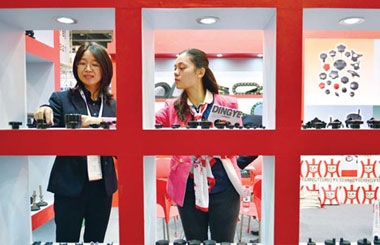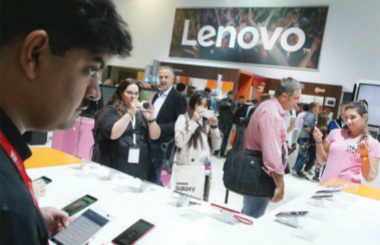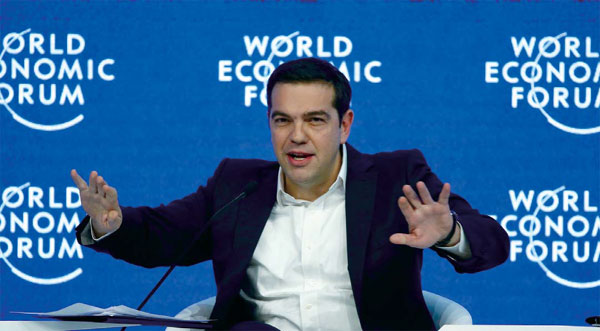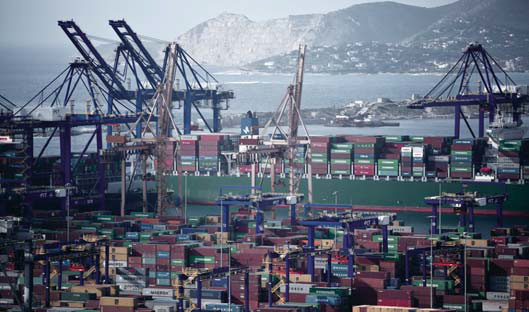China gives Greek leader a hand
Updated: 2016-01-29 07:52
By Maria Petrakis(China Daily Europe)
|
|||||||||||
Chinese state shipping giant Cosco, submitting the sole binding bid for Piraeus Port, made the deal more palatable to Greeks by raising its offer
It could have been part of the script that has dogged Greek leaders for the past six years: A Greek prime minister trying to convince world leaders and executives that Greece is worth investing in as Greeks take to the streets to protest reforms demanded in return for billions of euros in rescue funds.
But the most leftwing of all Greek prime ministers, Alexis Tsipras, got a helping hand in Davos at the World Economic Forum this month. As he pitched for more growth, not austerity, amid growing domestic opposition to new pension cuts, the Chinese decided Greece was worth sticking with and increased the price state-owned Cosco Shipping Group Co would pay to control Greece's biggest harbor.
|
Greek prime minister Alexis Tsipras said in Davos this month that his priority is growth. Ruben Sprich / Reuters |
|
Premier Li Keqiang called Piraeus China's gateway to Europe during a visit to Greece in June. Angelos Tzortzinis / AFP |
It's a development that appeared unlikely when Tsipras was first elected prime minister a year ago, vowing to halt privatizations like that of Piraeus Port Authority and tearing up the two bailout agreements that forced higher taxes and cuts in wages and pensions on Greeks.
But Cosco has kept its sights firmly on Piraeus as a lynchpin in China's plan to create a modern commercial empire pumping Chinese goods throughout the continent and European goods back into China. It's one goal of the Belt and Road Initiative, which would use trade and infrastructure investment to create ties inspired by the ancient Silk Road.
To do that, Cosco has overcome Greek campaign promises to cancel, renegotiate or delay the deal as politicians sought votes from union workers, such as those at the Piraeus docks.
Control of Piraeus "is the most important step in linking Europe to Asia", says George Tzogopoulos, a research fellow at the Athens-based Hellenic Foundation for European and Foreign Policy. "That is why Cosco was so patient with Greek madness."
Tsipras has tempered his tone since being forced in July to accept a new 86 billion euro ($93 billion) bailout to keep Greece in the eurozone. And while Greek officials confessed to being disappointed that Cosco was the only bidder to present a binding offer last week, the Chinese shipping giant stepped up to the plate when the Greek government asked for an improved offer.
Cosco's price of 22 euros a share, or 368.5 million euros, for the 67 percent stake in Piraeus beat a range set by two independent valuers of 18.4 euros to 21.2 euros a share. The offer comes with commitments for investments and is worth 1.5 billion euros to the Greeks after factoring in dividends and income from the concession agreement.
Analysts see Chinese investment in Piraeus as a key part of China's Belt and Road policy. Since the Chinese shipping behemoth began its container operations there in 2009, traffic has surged at Piraeus, making the harbor one of the fastest-growing ports in the world. Premier Li Keqiang called Piraeus China's gateway to Europe during a visit to Greece in June.
It hasn't been easy. Cosco has seen five separate Greek premiers, not including caretakers, since it won the license to operate Pier II in 2008 for 30 years at a cost of 490 million euros. Cosco's offer was a 70 percent premium to the closing share price of Piraeus Port of 12.95 euros on Jan 20, and values the entire business at 550 million euros. Piraeus Port shares rose as much as 8.8 percent in trading on the Athens exchange after that.
The Piraeus sale is also seen as a yardstick in Greece's lackluster state asset sales program, a key revenue-raiser tied to the country's qualifying for billions in rescue funds from its European partners and the International Monetary Fund. The government recently wound up previously agreed deals for the privatization of 14 regional airports and the sale of a seaside resort. Both those deals had been halted when Tsipras came to power last year.
Cosco's supremacy at Piraeus is thought to be a prerequisite to unleashing more Chinese investment in Greece, where unemployment has soared and foreign investment has dried to a trickle amid six years of political turmoil and concerns of financial collapse.
Because the Mediterranean is a key European entry point for Chinese products such as clothing, manufacturing machinery, household appliances, vehicle parts and industrial yarn, as well as automobiles from Japan and South Korea, Piraeus Port has more potential to attract international shipping companies' regional transit centers and service branches.
Greek officials expect Chinese investment in projects such as a major freight and logistics center on the outskirts of the Greek capital and a new airport planned for the island of Crete.
"A new day is dawning for the port of Piraeus and the country: jobs for all and income for the state, as Cosco has already shown," Michalis Nomicos, the president of Donomis Cruise Services, said in a statement. "It's a given that cruise services and Piraeus' competitiveness in the Mediterranean will improve."
The transaction will be a two-step deal: Cosco will buy a 51 percent stake in Piraeus for 280.5 million euros and will acquire the additional stake in the next five years for 88 million euros on completion of the terms in the shareholder agreement, including investments.
For China Daily
(China Daily European Weekly 01/29/2016 page30)
Today's Top News
Record number of Chinese tourists visited UK in 2015
Foreigners fill in Spring Festival courier gap
UK adventurer dies on solo journey
Families of expats in China can stay longer
China's growth envy of developed world
Foreigners find hard to buy China's rail tickets
Rags to riches saga underlines China's transformation
Leaders address Iran's thirst for growth
Hot Topics
Lunar probe , China growth forecasts, Emission rules get tougher, China seen through 'colored lens', International board,
Editor's Picks

|

|

|

|

|

|








